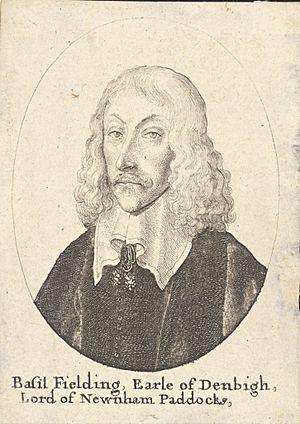Basil Feilding, 2nd Earl of Denbigh facts for kids
Basil Feilding, 2nd Earl of Denbigh (born around 1608, died 1675) was an important English person. He worked as a diplomat, which means he represented his country in other nations. He was also a politician and a military officer. During the English Civil War, he fought for the Parliament, making him a Roundhead.
Contents
Basil Feilding's Early Life and Education
Basil Feilding was the oldest son of William Feilding, 1st Earl of Denbigh and Lady Susan Villiers. In March 1629, he became a member of the House of Lords as Baron Fielding. This was an important part of the English government.
Around this time, his grandmother, a powerful woman called the Countess of Buckingham, gave him a lot of land. This land was near his family's estate at Newnham Paddox in Warwickshire. The land included most of the village of Monks Kirby. Basil studied in Switzerland and went to Basel University in 1631.
His Time as a Diplomat
After his studies, Basil Feilding joined the military in the Netherlands. He was part of a big battle called the siege of Bois-Le-Duc.
In 1634, King Charles I sent him to Venice as an ambassador. He stayed there for five years, representing England's interests.
Basil Feilding and the English Civil War
When the English Civil War began, Basil Feilding chose to support the Parliament. This was different from the rest of his family, who supported the King. He led a group of soldiers on horseback at the Battle of Edgehill. Sadly, his father, who was fighting for the King, was hurt in this battle and later passed away.
In April 1643, Basil became the Earl of Denbigh. He was then made the main commander of the Parliament's army in Warwickshire and nearby areas. He also became the Lord Lieutenant of Warwickshire, a key leader for the county.
His Role in Parliament
In 1644, Basil Feilding was very active in the war. However, some people did not fully trust him. He decided to leave his command after a new rule, called the Self-denying Ordinance, was passed in April 1645. This rule meant that members of Parliament could not also be army officers.
Basil Feilding was chosen to talk with the King during peace discussions. He was a commissioner at the Treaty of Uxbridge in 1645 and again at Carisbrooke in 1647. A historian named Clarendon wrote that Basil privately said he wished he could help King Charles I.
He supported the New Model Army in their disagreements with the Long Parliament. However, he refused to be involved in the decision to execute King Charles I.
Later Life and Legacy
During the time of the Commonwealth, Basil Feilding was a member of the Council of State. This was a group that helped govern England. Over time, he became less supportive of his former Parliamentarian friends and was seen more as someone who favored the King.
After the King returned to power in 1660, King Charles II made him Baron St Liz in 1664. Basil Feilding was married four times, but he did not have any children. He passed away in 1675.
His titles then went to his nephew, William Feilding, 3rd Earl of Denbigh. This nephew was the son of Basil's brother, George. Since then, the titles of Earl of Denbigh and Earl of Desmond have been held together by his family.
See also
 | Precious Adams |
 | Lauren Anderson |
 | Janet Collins |


